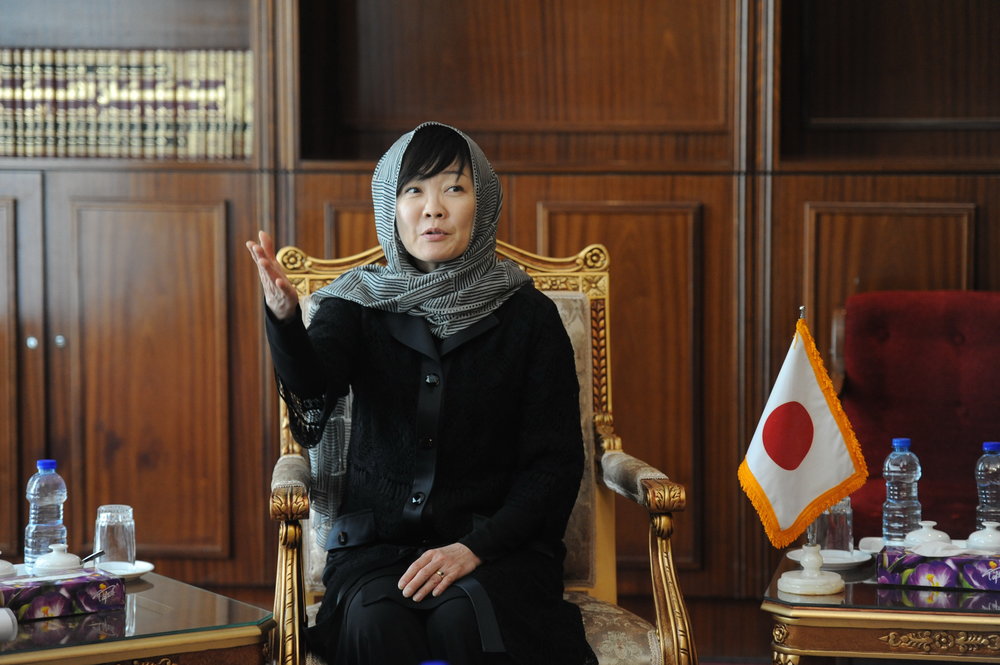Akie Abe: Mindset change needed on role of women

TEHRAN – Akie Abe, wife of the Japanese prime minister, believes that a change of mindset is needed so that women can play their role in society.
“From a mindset perspective, men and women should share the same view so that women-engaging society can be built,” Akie Abe tells the Tehran Times in an exclusive interview.
This is the text of the interview:
Q: As a high profile woman, how do you see females’ role in the current Japanese society as well as in their household relations?
A: It is a matter of course that women performing as the labor force in Japan since we are facing less birth rate, with increased ageing population. I expect that the new viewpoint can be brought to the society if women become more actively involved.
The society in Japan is structured in a way that men perform the central role in a vertical pyramid organization, thus the structure prioritized the profit making that often led to conflict within the society which did not lead to building a peaceful society.
The nature of women is to give birth to new life so they are good in helping each other than seeking for vertical society building. I wish that women could expand their role in a horizontal manner than vertical, thus less conflict in the society.
Q: How do you evaluate your husband’s “womenomics’ program” which is aimed to have women occupy 30 percent of management positions by 2020. What obstacles do you see on his way to achieve this goal?
A: I have heard that there is a criticism of women taking a managerial position without any training. However, I think that it is good to have new aspiration towards new objective. In fact, new female management is striving for achievement, and the organization is struggling to support achieving the target.
Having women’s view reflected to the management’s decision-making will enable working environment more welcoming for women. It seems that the business custom that engages women seems to be absent. For example, full time presence in the office during working hours for women with small children isn’t suitable. There are not many changes yet to these customary environments. I hope that the environment will improve in the future as more women become active.
Q: Do you think that Japan is ready to have a female prime minister in the near future?
A: Well, I do not know.
Q: As wife of the Japanese prime minister how successful do you think you have been in promoting women’s role in Japan?
A: I would say that it means a big deal when the head of state presents the direction for its country. Especially for women, or for people who support women to take an active role, the prime minister’s commitment must have been encouraging. Women will become more aspired and the support given to that will be promoted further.
Such willingness to change at each level will help transform the momentum which leads to successful outcome. I am looking forward for the day to come when people outside of Japan commending on Japanese women’s active role in the society.
Q: Can you compare Japanese and Iranian women together in terms of social roles each play in their societies?
A: Each country has its own culture and thinking. However, it is common when it comes to the basic women’s issues. Thus, it is important that such commonality should be shared to seek for solutions together. I believe such cooperation can be made between Iran and Japan, so that the two nations will be able to build women-engaging society.
Q: In general, what should be done to promote women’s role?
A: From the systems’ perspective there has to be childcare facilities and the different ways of work that would entice women to be actively engaged in the workforce. From a mindset perspective, men and women should share the same view so that women-engaging society can be built. I think that both men and women should change.
Q: What steps are needed to be taken to train ‘environment-friendly’ women or families?
A: The childhood education is important. Children will be able to appreciate the importance of nature and will be able to acclimate to the environment by parents providing opportunities for their children to be able to feel-and-touch the great nature along with the textbook learning in classrooms.
Leave a Comment